Ministers 'should let traders sell groceries in pounds and ounces' in wake of Brexit vote - Telegraph
Post-Brexit grocers say let us sell in pounds and ounces | Daily Mail Online
After Brexit, some Brits want to ditch the metric system, too - The Washington Post
And in Devon, it was actually happening:
Brexit butcher begins to sell meat using imperial system | The Independent
Devon butcher selling meat in pounds and ounces following EU referendum result | Plymouth Herald
North Devon butcher offers meat in pounds and ounces following vote to leave the EU | North Devon Journal
This week, the BBC has been covering the latest:
Could Brexit lead to comeback for pounds, ounces and yards?
- 21 September 2016
- UK Politics
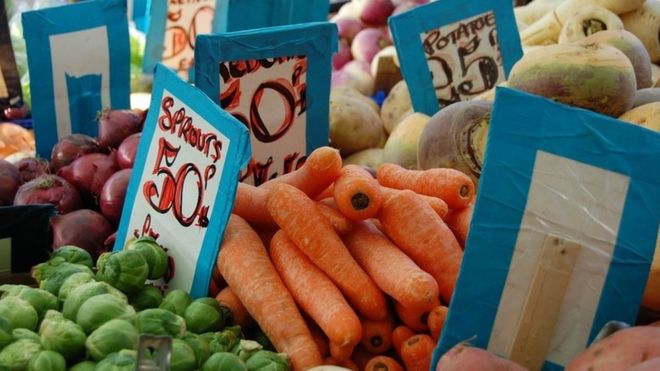
Not giving an inch, going the extra mile, entering the final furlong, piling on the pounds and doing the hard yards - the English language is rich with phrases derived from the units British people use to measure distances, sizes and quantities.
Known as imperial measures - because they were defined in law in the early 19th Century and spread across the British Empire - these units have a place in our collective vocabulary and history, but could they be about to make a comeback in every day commercial use following the vote to leave the EU?
Although steps towards metrication began nearly a decade before the UK joined the EU in 1973, the gradual adoption of a French measurement system has become synonymous with European integration in the eyes of many and Brexit a priceless opportunity to inch away from it.
Since June's Brexit vote, a number of companies, ranging from butchers to wine merchants, have said they would relish the chance to be able to trade in imperial units.
Simon Berry, chairman of Berry Bros & Rudd, has gone as far as to say it is his lifetime's ambition to sell champagne in pint-sized bottles - currently outlawed in the UK - and in his words to reclaim it from "rules-obsessed bureaucrats".
'Part of identity'
Campaigner Warwick Cairns says people feel this way because imperial measurements are not only easily understandable but inherently popular.
"There is something about feet and inches that feel part of our identity and culture," he says. "They make sense on a human scale, they make sense on a cultural scale. It is part of us."
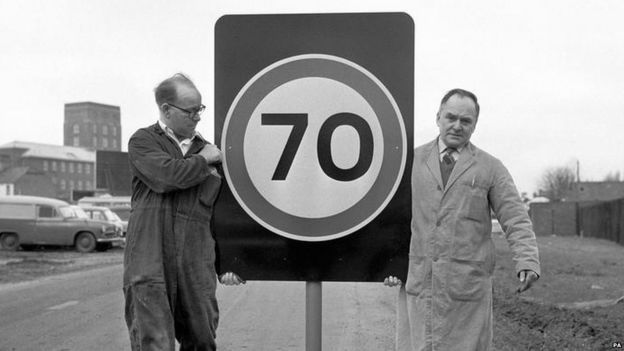 PA
PA
A brief history of weights and measures
- AD965: King Edgar decrees only "one weight and measure shall pass through the King's dominions".
- 1824: The British Weights and Measures Act defines imperial units
- 1960: India begins the transition from imperial to metric
- 1965: The UK government says industry should embrace metric within 10 years
- 1971: Decimal currency is introduced in the UK
- 1973: The proposed date for adopting kilometres for road signs lapses
- 1985: The Weights and Measures Act recognises the parity of metric and imperial measures
- 1994: Regulations are introduced requiring weighing in metric
- 2001: Steve Thoburn and other market traders are convicted for selling goods in only imperial measures
- 2008: EU commissioners rule Britain can carry on using imperial measurements such as pints, pounds and miles
Mr Cairns, who represents the imperial-supporting British Weights and Measures Association and is the author of a book about the issue, insists that people should not be required to use either system, because modern technology can easily accommodate both.
"This is the chance for people to be free to use whatever measures they please," he says.
"Take my bathroom scales. If I want to weigh myself in kilograms, I can. Flick the switch the other way, and I can weigh myself in stones and pounds. There is no reason why you can't do that."
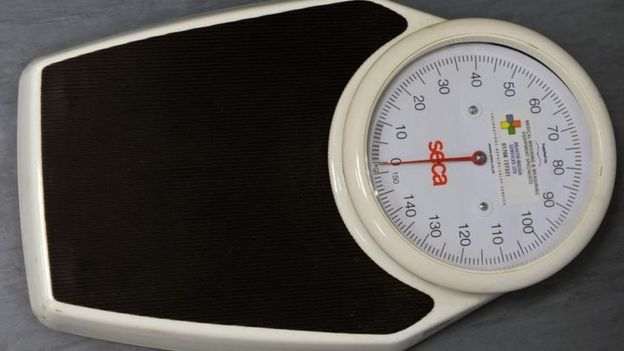
Controversial attempts by the EU - aided and abetted by successive British governments - to make the UK move to a single metric system officially came to an end in 2008, when Brussels agreed to the continued use of pints (for draught beer and cider), pounds and miles, alongside metric units.
Current laws require traders to use metric measurements when weighing packaged or loose goods for sale in England, Wales and Scotland but still allow them to sell goods in imperial quantities and display prices in imperial as long as they do not "stand out more" than the metric signs alongside them.
The rules are not rigorously enforced today, after public and political furore over the prosecution of the "metric martyrs", a group of market traders convicted 15 years ago of selling goods using only imperial measures.
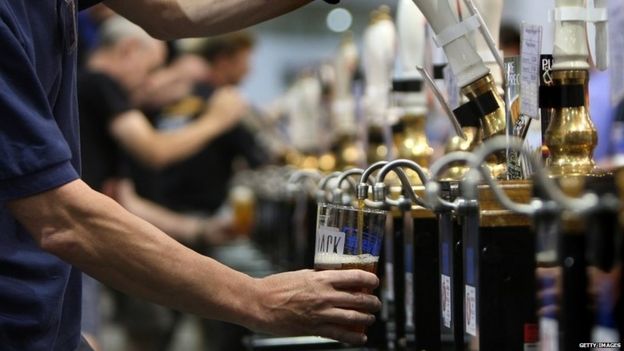 GETTY IMAGES
GETTY IMAGES
But they are still seen, by both sides of the argument, as a dog's breakfast ripe for reform.
Advocates of metric say it is perfectly feasible for the two systems to co-exist but does not make commercial sense.
"The current measurement muddle aids only our competitors," says Derek Pollard, the chairman of the UK Metric Association.
'Norms and rules'
With 90% of the UK's trade taking place with metric countries - the US being the stand-out exception - he says the UK would be at a big disadvantage if it reverted.
"To compete effectively, we need a single, logical and universal measurement system that everyone understands and is familiar with," Mr Pollard says.
This view is shared by the UK Weighing Federation, which speaks on behalf of companies manufacturing, installing and repairing commercial scales and associated equipment - including components, instrumentation and software.
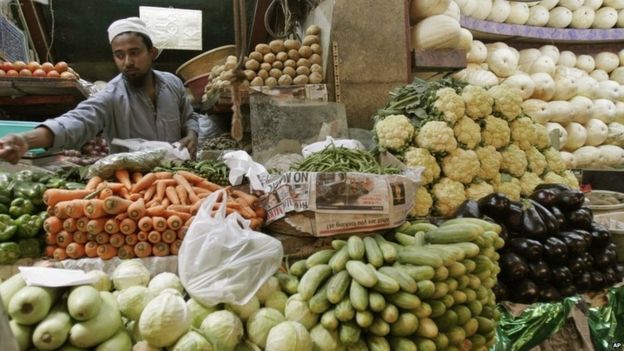 AP
AP
Not only, it says, are most imperial measuring scales now consigned to people's lofts or on display in museums, but the equipment used to test commercial weights to guarantee their conformity with technical and safety standards - a procedure known as type approvals - is not available for any mass switch back to imperial.
"All measuring equipment is designed to record in metric," says its president, Nick Catt.
"If you want to be a manufacturing country and want to have a strong connection with Europe, then you have to follow the European norms and rules.
"Otherwise it would be chaos and it would be consumers who lose out."
'Impractical'
Having a dual system of metric and imperial would, he says, involve a "phenomenal" cost to retailers, which would inevitably be passed on to customers - an outcome at odds with the deregulatory impetus behind Brexit.
"It would just not be practical," Mr Catt says.
"You would have to teach kids in schools what pounds are.
"We are talking about an era that is gone, and we can't turn the clock back that far."
The act of Brexit, in and of itself, will not see "lb" signs springing up all over the UK.
For that to happen, Parliament would need to repeal the current regulations, dating back to the mid-1990s, obliging traders to sell their products in metric weights.
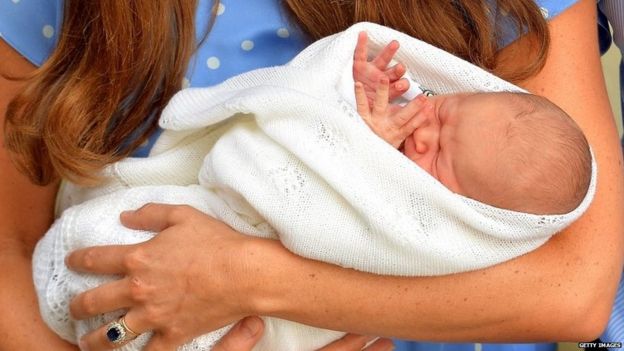 GETTY IMAGES
GETTY IMAGES
As far as the government is concerned, such a change is not on the horizon while it focuses on reassuring investors the UK is open for business globally after the Brexit vote.
"Businesses can already use imperial units alongside metric, or on their own for draught beer and cider, bottled milk and road traffic signs," a spokesman for the Department for Business, Energy and Industrial Strategy said.
"This is national legislation and there has been no change to the law since the referendum result."
While the issue is unlikely to be the first port of call for MPs as they seek to decouple the UK from 40 years of EU-related legislation over the coming years, there is a body of opinion within Parliament that would support such a move.
In 1998, 89 MPs signed a parliamentary motion opposing compulsory metrication and the prosecution of traders continuing to use imperial.
The motion, which also pledged its support for the "use of customary UK measures", shows imperial measures have friends in high places.
Among those to sign were Jeremy Corbyn and Philip Hammond - then humble backbenchers but now Labour leader and Chancellor of the Exchequer.
Could Brexit lead to comeback for pounds, ounces and yards? - BBC News
Meanwhile, at Metric Views:
Cash coshed
In recent weeks, several pro-Brexit newspapers and politicians have raised issues related to the UK’s measurement mess, so we are allowing a Remainer to counter their arguments.
UKMA took no view on whether the UK should remain in or leave the EU – there may be 27 metric countries in the EU, 28 if you include the UK, but there are around 170 other metric countries around the world, including most of the Commonwealth countries that formerly used imperial measures. Indeed, it could be argued that completing the UK’s metric changeover and ending the current muddle will become more important, not less, after Brexit.
Anyway, here, in full, is an article published by Jon Danzig on 6 September.
“Sir Bill Cash MP falsely claims the EU outlawed imperial measures in the UK.
Brexiteers keep telling Remainers to shut up and accept the Referendum result. But it seems nothing can make ‘Leave’ politicians shut up from continuing to spread mistruths about the EU in support of Brexit.
So, of course, the Brexit debate has to continue.
This week, veteran Tory Eurosceptic, Sir Bill Cash MP, repeated in The Sun newspaper old chestnuts about the EU and imperial measures.
He wrote, “The criminalisation of retailers for daring to sell groceries in pounds and ounces was one of the biggest outrages of EU policy.”
And he added, “Now an end to that injustice with the so-called ‘Metric Martyrs’ is within sight. The fanatics and bureaucrats — who are often the same thing — wanted to persecute shopkeepers just for using imperial measurements their customers understood.”
But as the European Commission pointed out:
“The EU has never banned pounds and ounces or other imperial measures.
“EU law does require metric measurements to be used – though already in 1965, eight years before joining the EEC, the Wilson Government decided to initiate the UK’s metrication programme, in response to global moves in this direction.”
EU law has always allowed imperial measures to be used alongside metric ones.
The so-called ‘Metric Martyrs’ were prosecuted in 2001 for using illegal scales, which were not capable of weighing in both imperial and metric systems. They lost their court cases and appeal.
At the time, a government spokesman commented, “In the UK we have been moving to metric since 1965. This is not a European issue. Most of the world has gone metric.”
Back in 2001, the EU Commission also commented:
“Metrication in the UK is not the result of British membership of the EU. In 1965, eight years before joining the EEC, the Wilson Government decided to initiate the UK’s metrication programme, in response to global moves in this direction – Ireland and all Commonwealth countries had already adopted the metric system.
“The transition has been a gradual one but, for almost three decades now, children in British schools have enjoyed a metric-only education.”
But prominent Brexiteer, Sir Bill Cash, stated this week, “We have a complete culture of traditional thinking on the subject of imperial measurements and yet metric was just imposed on us.
“There will be people who say, ‘I have been brought up at school being taught in metres and kilometres, and other metric units’, and that is perfectly understandable. They should not worry. There will still be grams and kilograms.”
Added Sir Bill:
“But there are many people who wish to return to traditional imperial measurements and there is no reason on Earth why they should not be allowed to do so, alongside metric.”
And that’s exactly what we have now, Bill. Why are you continuing to spread misleading statements about the EU in support of Brexit?”
Jon Danzig is running a campaign for Britain to remain in the EU. More details on his Facebook community page Reasons2Remain. He is also an award-winning medical and investigative journalist, formerly at the BBC. He specializes in writing about health, human rights and the European Union. More at: www.jondanzig.com.
EU | Metric Views
.
.
.

No comments:
Post a Comment